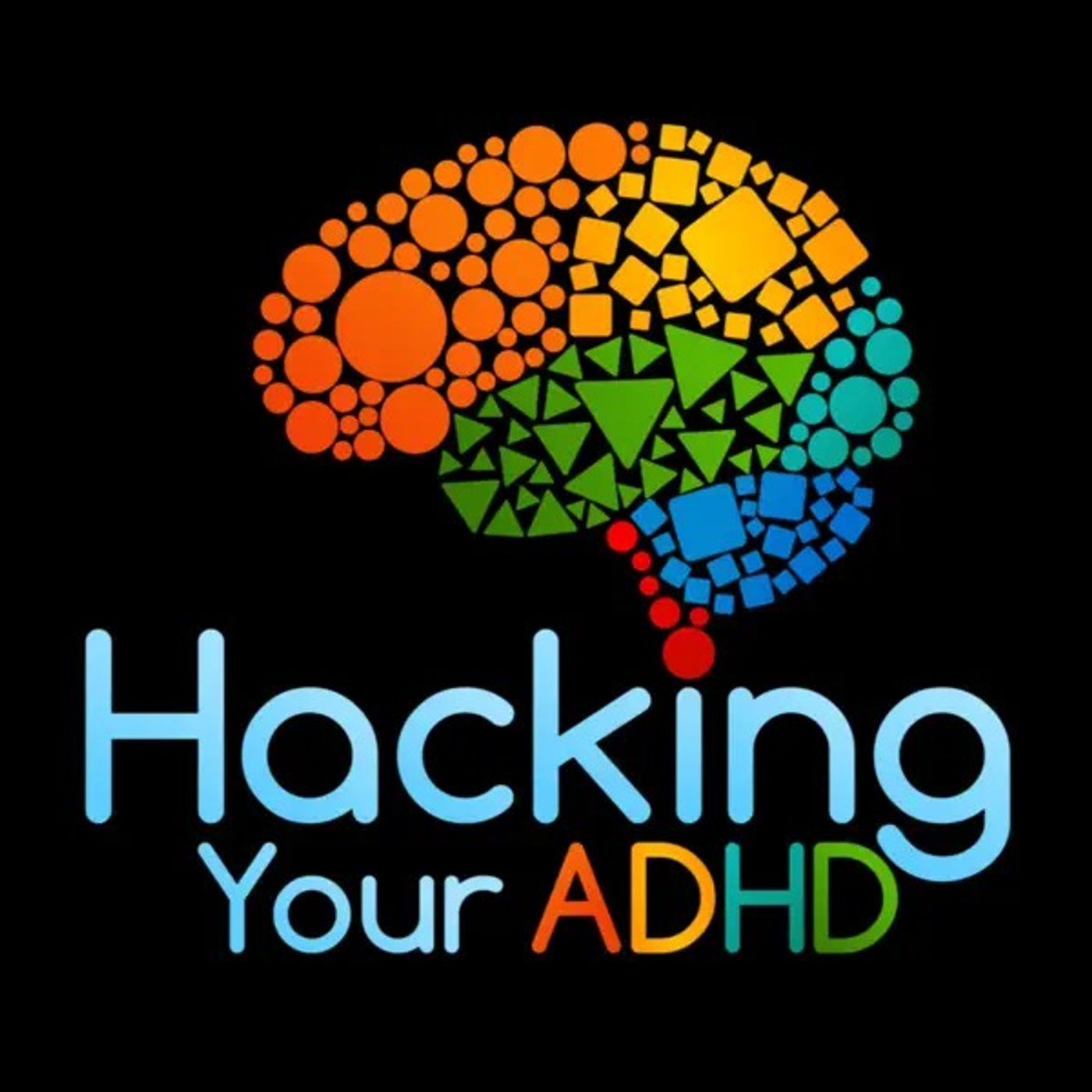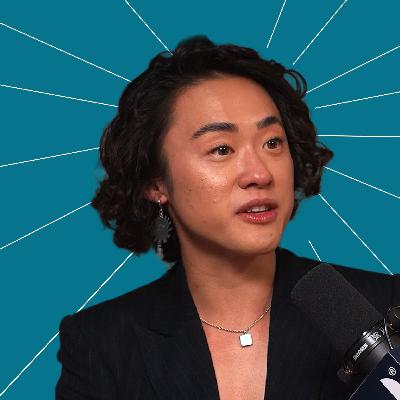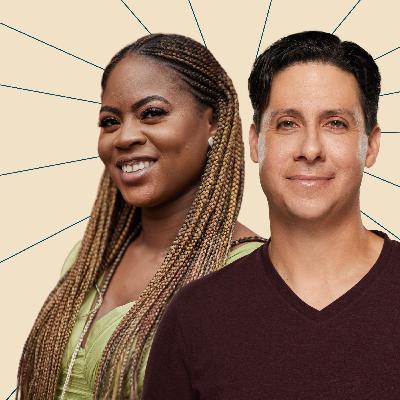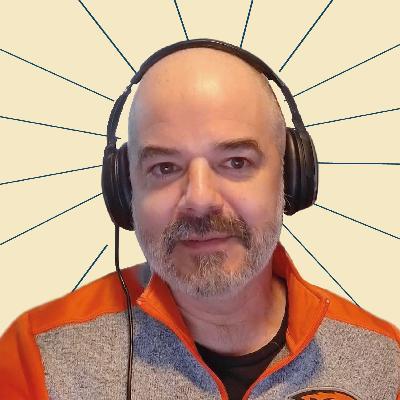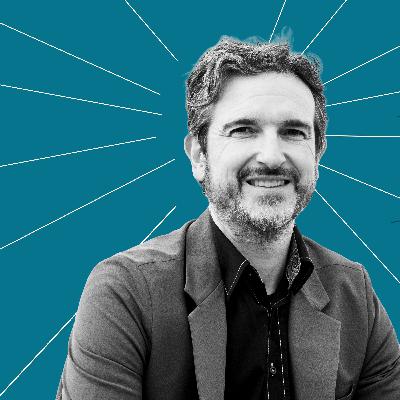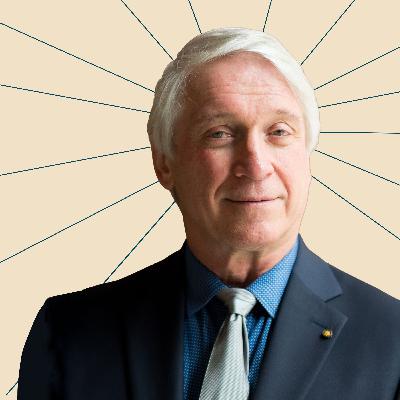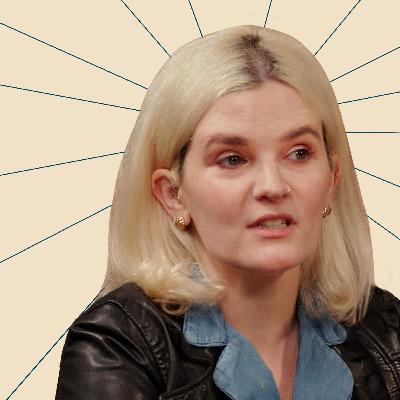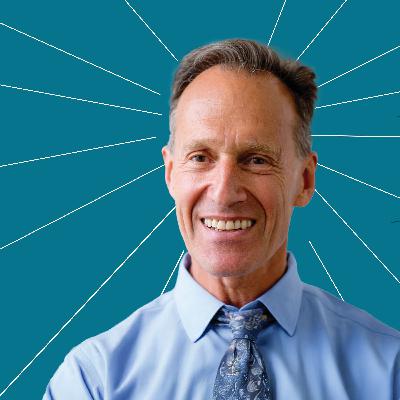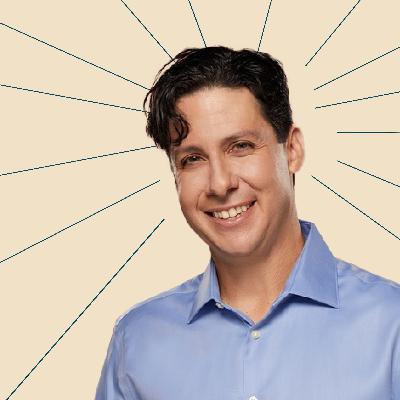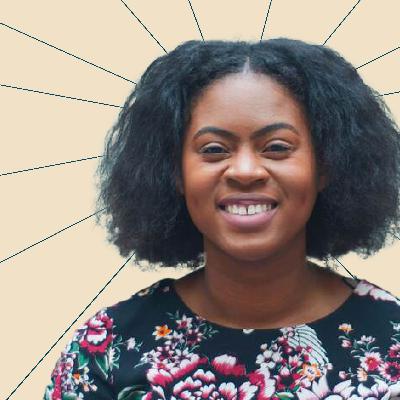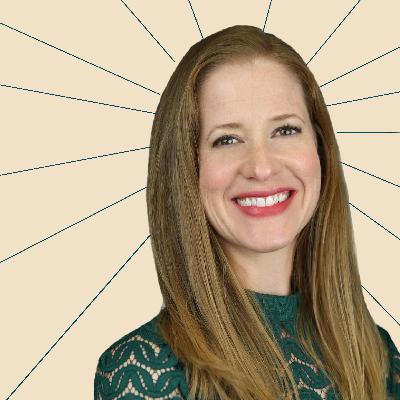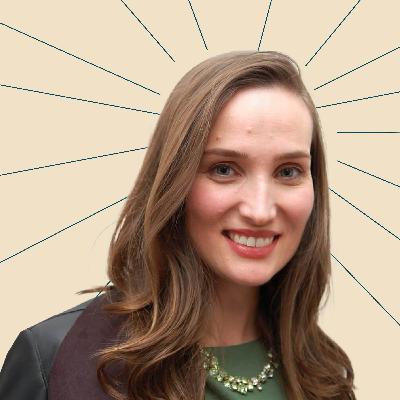Discover Hyperfocus with Rae Jacobson
Hyperfocus with Rae Jacobson

Hyperfocus with Rae Jacobson
Author: Rae Jacobson, Understood.org
Subscribed: 43Played: 582Subscribe
Share
Description
Hyperfocus is a show that zeroes in on what fascinates us about ADHD, mental health, and learning.
Big questions like, “Does ADHD make you more likely to have postpartum depression?” Little nitpicks (TikTok was wrong about something?!), and personal conversations with everyone from old bosses and hilarious comedians, to leading researchers.
Because on this show, hyperfocus isn’t the distraction — it’s the assignment.
Big questions like, “Does ADHD make you more likely to have postpartum depression?” Little nitpicks (TikTok was wrong about something?!), and personal conversations with everyone from old bosses and hilarious comedians, to leading researchers.
Because on this show, hyperfocus isn’t the distraction — it’s the assignment.
36 Episodes
Reverse
This week on Hyperfocus, Rae is in the guest seat for an appearance on Hacking Your ADHD, a podcast hosted by William Curb. Listen for a fascinating conversation on a topic that’s really common in ADHD circles: the tendency to attribute everyday behaviors to ADHD.For more resources, visit Hyperfocus on Understood.org. You can also email us at hyperfocus@understood.org.
Understood is a nonprofit organization dedicated to empowering people with learning and thinking differences, like ADHD and dyslexia. If you want to help us continue this work, donate at understood.org/give Hosted by Simplecast, an AdsWizz company. See pcm.adswizz.com for information about our collection and use of personal data for advertising.
One of the most urgent ADHD research gaps has to do with ADHD and trans people. We know there are lots of trans folks with ADHD. But when it comes to understanding how best to treat them, it’s a whole different story. That’s why we wanted to talk to someone who knows this experience well. Ivan Hsiao is the founder of Trans Health HQ. He joined this week’s Hyperfocus to share his own diagnosis story and to talk about what we do (and don’t) know about being trans with ADHD. For more on this topic: Trans Health HQBeing trans with ADHD (Max’s story)Talking about neurodivergence and gender identityTimestamps: (01:26) Ivan’s diagnosis story(11:18) Trans broken arm syndrome(13:56) What research is there on ADHD in trans people? (17:23) How to practice better careFor a transcript and more resources, visit Hyperfocus on Understood.org. You can also email us at hyperfocus@understood.org.
Understood is a nonprofit organization dedicated to empowering people with learning and thinking differences, like ADHD and dyslexia. If you want to help us continue this work, donate at understood.org/give Hosted by Simplecast, an AdsWizz company. See pcm.adswizz.com for information about our collection and use of personal data for advertising.
Last month, the Trump administration laid off over 460 people in the U.S. Department of Education. It included nearly everyone in the Office of Special Education Programs (OSEP), which enforces federal special education laws. A federal judge has temporarily halted the layoffs, but it’s unclear what will happen next. For people who work in or rely on special education services — including 7.5 million kids — the chaos and worry have already begun.So on this week’s Hyperfocus, we wanted to talk to smart people who could give us some perspective on what’s happening. What could it mean for families and for schools? And what does it say about how the administration views neurodivergent people in general?Our guests are Meghan Whittaker, a former chief of staff at the U.S. Department of Education, and Julian Saavedra, an assistant principal. For more on this topic: What the special education layoffs mean for your child’s IEP and school servicesWhat happens to my child’s IEP if the U.S. Department of Education closes?The R-word is back: How do you get people to care? Special education: Federal law vs. state lawTimestamps:(03:04) A breakdown of the layoffs(10:16) How worry is already hitting families and schools(18:02) What to know about school vouchers(29:50) “Find your space to serve”For a transcript and more resources, visit Hyperfocus on Understood.org. You can also email us at hyperfocus@understood.org.
Understood is a nonprofit organization dedicated to empowering people with learning and thinking differences, like ADHD and dyslexia. If you want to help us continue this work, donate at understood.org/give Hosted by Simplecast, an AdsWizz company. See pcm.adswizz.com for information about our collection and use of personal data for advertising.
ADHD just keeps finding itself in the news. It can feel like a lot for those of us who have it or care for someone who does. Recently, Hyperfocus host Rae Jacobson sat down with a couple colleagues at Understood.org for a livestream to discuss the news and take community questions. Her guests were Dr. Andy Kahn, a licensed psychologist, and Dr. Keona “KJ” Wynne. Together, they chatted about the controversy surrounding Tylenol, what we really know about the cause of neurodevelopmental disorders, and how to talk to your kids about scary or misleading messages in the news.On this week’s Hyperfocus, we’re sharing that conversation in full. For more on this topic:Fact-checking the MAHA report’s claims about ADHDA history of ADHD medicationTimestamps: (01:10) Does Tylenol use during pregnancy cause neurodevelopmental disorders?(15:32) Is ADHD being overdiagnosed?(28:35) Are too many kids taking stimulant medications? (41:01) How can we talk to our kids about scary or misleading media messages?For a transcript and more resources, visit Hyperfocus on Understood.org. You can also email us at hyperfocus@understood.org.
Understood is a nonprofit organization dedicated to empowering people with learning and thinking differences, like ADHD and dyslexia. If you want to help us continue this work, donate at understood.org/give Hosted by Simplecast, an AdsWizz company. See pcm.adswizz.com for information about our collection and use of personal data for advertising.
Inattentive ADHD often goes unnoticed. It’s an easier type of ADHD to miss because it’s more internal and less outwardly visible than its hyperactive, impulsive counterpart. But left unaddressed, inattentive ADHD can be just as disruptive.Boys with the inattentive type are especially overlooked — they don’t match the stereotype of what an “ADHD boy” is supposed to look like.So when Brandon Saiz wrote to us about his experience getting diagnosed with ADHD later in life, we knew we had to talk to him. After meeting with Brandon, it was clear his story needed to be shared.Content warning: This episode includes discussion of suicide. Please skip it if that’s not something you’re up for right now.For more on this topic:The 3 types of ADHDListen: The “devastating” findings of a decades-long ADHD studyBrandon Saiz on SubstackDuck, Duck! It's a Goose: Brandon's video gameTimestamps(01:54) Brandon’s background(09:23) How Brandon’s inattentive-type ADHD was overlooked(14:00) On suicidal ideation and inattentive ADHD (19:57) Brandon’s advice to othersFor a transcript and more resources, visit the Hyperfocus page on Understood.org. We love hearing from our listeners! Email us at hyperfocus@understood.org.
Understood is a nonprofit organization dedicated to empowering people with learning and thinking differences, like ADHD and dyslexia. If you want to help us continue this work, donate at understood.org/give Hosted by Simplecast, an AdsWizz company. See pcm.adswizz.com for information about our collection and use of personal data for advertising.
Artificial intelligence has cemented itself as the latest world-altering technology. It follows the same lineage as electricity, the television, the internet — the list goes on. Depending on who you talk to, AI is the greatest thing ever or the thing that will destroy the world, with lots of room in the middle for discussion and experimentation. But within the bigger AI fascination, there’s a smaller yet critical conversation about how this technology might help or harm people who learn and think differently. That’s why we brought in Dr. Amy Gaeta for this week’s “Hyperfocus.” She’s an AI ethicist and researcher who also has autism, giving her a unique insight that she shares on our latest episode. For more on this topicAmy’s websiteWhat is assistive technology?6 ways AI can help you manage ADHD symptomsHow software and apps can help with math challengesUnderstood AssistantTimestamps(03:40) AI in the workplace(10:16) Disability justice and technology(13:45) AI’s built-in bias against disability (17:15) How to find helpful, safe AI uses(21:08) Chatbot therapy (25:14) What does the future hold for AI and neurodivergence? For a transcript and more resources, visit the Hyperfocus page on Understood.org. We love hearing from our listeners! Email us at hyperfocus@understood.org.
Understood is a nonprofit organization dedicated to empowering people with learning and thinking differences, like ADHD and dyslexia. If you want to help us continue this work, donate at understood.org/give Hosted by Simplecast, an AdsWizz company. See pcm.adswizz.com for information about our collection and use of personal data for advertising.
Craig Thomas is best known for his work on TV. He co-created the sitcom “How I Met Your Mother” and has written for “American Dad” and more. He’s penned songs for “Sesame Street” and essays for “The New Yorker.” He’s less known for being a dad. For now, at least. He has a daughter, Celia, and a son, Elliot, who was born with Jacobsen syndrome, a genetic condition causing physical and developmental disabilities. When Elliot was born, Craig’s career was taking off with “How I Met Your Mother.” “I was living an hour drama show at home and then driving to work and doing a sitcom,” Craig says. His upcoming novel, “That’s Not How It Happened,” is based in part on his family’s experience.If you heard our series on the resurgence of the R-word, you’ll recognize Craig’s voice. The conversation with him was so good that we’re sharing more!For more on this topicPreorder Craig’s novelCheck out Craig’s podcastHear Craig on our R-word episodes, part 1 and part 2Timestamps(02:20) Craig’s backstory and current work(09:45) How Craig relates to the disability community(13:10) Disability and media depictions (29:04) Comedy, the R-word, and why language matters(39:10) On parenting a child with disabilitiesFor a transcript and more resources, visit the Hyperfocus page on Understood.org. We love hearing from our listeners! Email us at hyperfocus@understood.org.
Understood is a nonprofit organization dedicated to empowering people with learning and thinking differences, like ADHD and dyslexia. If you want to help us continue this work, donate at understood.org/give Hosted by Simplecast, an AdsWizz company. See pcm.adswizz.com for information about our collection and use of personal data for advertising.
To celebrate this holiday weekend, we’re reposting one of our early favorites. It’s a fascinating — and heartbreaking — deep dive into one of the most important studies ever done on girls with ADHD.Check out Rae’s interview with Dr. Stephen Hinshaw, leader of the famous Berkeley Girls study, and learn why Dr. Hinshaw himself calls the findings “devastating.”Timestamps(4:45) The beginnings of the Berkeley Girls Study(6:50) Combined-type ADHD and negative outcomes(11:43) Self-esteem, ADHD, and girlhood(18:45) ADHD as a “trend”(23:03) What to do about ADHD stigmaFor a transcript and more resources, visit the Hyperfocus page on Understood.org. We love hearing from our listeners! Email us at hyperfocus@understood.org.
Understood is a nonprofit organization dedicated to empowering people with learning and thinking differences, like ADHD and dyslexia. If you want to help us continue this work, donate at understood.org/give Hosted by Simplecast, an AdsWizz company. See pcm.adswizz.com for information about our collection and use of personal data for advertising.
One of the most inevitable questions that comes with early adulthood is also one of the most fraught: “When are you having kids?” The question is loaded with assumptions and pressure. It also seems to ignore the fact that having kids is supposed to be a choice, not a requirement. For neurodivergent people, especially those with ADHD, deciding whether to become a parent can be even more complex. On this episode of “Hyperfocus with Rae Jacobson,” we talk with author and editorial director Jordan Davidson. She’s interviewed hundreds of people about their decision on whether to become a parent. Related resourcesJordan’s book: “So When Are You Having Kids?”Podcast series: Climbing the WallsTimestamps(03:06) What inspired Jordan’s book(08:35) Jordan’s findings from hundreds of interviews(12:28) How to break schemas attached to parenthood(24:28) The fantasy of the “idealized parent” For a transcript and more resources, visit the Hyperfocus page on Understood.org. We love hearing from our listeners! Email us at hyperfocus@understood.org.
Understood is a nonprofit organization dedicated to empowering people with learning and thinking differences, like ADHD and dyslexia. If you want to help us continue this work, donate at understood.org/give Hosted by Simplecast, an AdsWizz company. See pcm.adswizz.com for information about our collection and use of personal data for advertising.
We’re picking up where we left off last time on Hyperfocus for the conclusion of our two-part series on the R-word’s resurgence. Today, we meet a comedy writer who shares his personal evolution with the word and hear from a disability advocate. We’ll also learn more from our research correspondent, Dr. KJ Wynne, and have producer Cody Nelson back on to hear from host Rae Jacobson about what she’s learned. Related resourcesAndrea Moore ArtsCraig Thomas’ upcoming novelDr. Chris Cipriano’s websiteWe love hearing from our listeners! Email us at hyperfocus@understood.org.
Understood is a nonprofit organization dedicated to empowering people with learning and thinking differences, like ADHD and dyslexia. If you want to help us continue this work, donate at understood.org/give Hosted by Simplecast, an AdsWizz company. See pcm.adswizz.com for information about our collection and use of personal data for advertising.
Last year, Rae and Cody at Team Hyperfocus noticed something unnerving: The R-word was coming back into public discourse. People, especially people in power, seemed to be using it more often, and more freely. We weren’t the only ones who’d spotted this upsetting trend. Researchers, disability advocates, and other journalists were also concerned. If this word, long considered a slur, was being used by some very powerful people, what did that mean for people with disabilities?So we dove in, talking to researchers, members of the community, and even a famous comedy writer. (You’ll see!) And we surfaced with another, deeper question: If the R-word can, and does, cause harm, how do you get people to care? Related resourcesSpread the Word campaignDisability Discourse MattersThe ‘R-Word’ Is Back. How a Slur Became Renormalized (Special Olympics) Rosa’s LawWe love hearing from our listeners! Email us at hyperfocus@understood.org.
Understood is a nonprofit organization dedicated to empowering people with learning and thinking differences, like ADHD and dyslexia. If you want to help us continue this work, donate at understood.org/give Hosted by Simplecast, an AdsWizz company. See pcm.adswizz.com for information about our collection and use of personal data for advertising.
Happy summer, everyone! Because of the holiday weekend, we’re re-airing one of our favorite Hyperfocus episodes yet, which happens to be our very first one. We’ll be back in your feeds with a fresh show in two weeks. After her daughter was born, Rae Jacobson was hit by a bout of severe postpartum depression. Back then, there wasn’t much out there about ADHD and women, let alone ADHD and postpartum mental health.Rae had heard that there was a link between ADHD and postpartum depression. But with a tiny baby to care for and a life to navigate, she had more pressing things to deal with. But the question kept bugging her: Does ADHD make you more likely to have postpartum depression?This week on Hyperfocus, Rae finally gets some answers to questions she has had for years. Her guest is Dr. Catherine Birndorf, an expert on postpartum mood disorders and co-founder, CEO, and medical director of The Motherhood Center of New York.We love hearing from our listeners. Email us at hyperfocus@understood.org.Timestamps(02:55) ADHD as a postpartum concern(09:47) PMADs: Not just the ‘baby blues’(14:21) What can struggling parents do?(21:07) Medication and pregnancyRelated resourcesCatherine’s book: What No One Tells You3 things I’m learning as a new mom with ADHD 72 hours in the life of a working mom with ADHDParenting tips when you and your child have ADHD
Understood is a nonprofit organization dedicated to empowering people with learning and thinking differences, like ADHD and dyslexia. If you want to help us continue this work, donate at understood.org/give Hosted by Simplecast, an AdsWizz company. See pcm.adswizz.com for information about our collection and use of personal data for advertising.
When you think about someone taking a psychedelic drug like magic mushrooms, the first images that come to mind probably don’t involve a medical professional in a white coat or any sort of clinical setting. However, the perception of these drugs is changing as researchers and health professionals continue to learn new ways these drugs can treat a variety of mental health conditions. Much of the research has to do with microdosing, or taking such a small dose of a drug that it doesn’t produce a “trip.” One of the more commonly microdosed drugs is psilocybin, the naturally occurring psychedelic compound found in “magic mushrooms.” That led our small-but-mighty team at Hyperfocus to wonder, “What could this all mean for ADHD treatment?” So, we looked for someone who might know, and it led us to Dr. Richard A. Friedman. He’s a professor, psychiatrist, and director of the Psychopharmacology Clinic at Weill Cornell Medicine, Cornell University’s medical school. Richard has also written about his areas of expertise for The New York Times and is a contributing writer at The Atlantic. On this week’s episode of Hyperfocus, he sits down with mental health journalist Rae Jacobson to answer all her questions on microdosing, psychedelics as medicine, and what it could mean for ADHD and more. Related resourcesADHD alternative treatmentADHD treatment without medication: What are my options?Richard’s piece on microdosing in The AtlanticTimestamps(02:58) What is microdosing?(10:43) What do we know about ADHD and microdosing?(15:30) How do psychedelics work in the brain?(30:44) Richard’s hopes for future research and microdosingWe love hearing from our listeners! Email us at hyperfocus@understood.org.
Understood is a nonprofit organization dedicated to empowering people with learning and thinking differences, like ADHD and dyslexia. If you want to help us continue this work, donate at understood.org/give Hosted by Simplecast, an AdsWizz company. See pcm.adswizz.com for information about our collection and use of personal data for advertising.
ADHD gets mentioned a lot in the new report from the Make America Healthy Again commission. It’s pitched as part of the “childhood chronic disease crisis,” and the authors make a lot of big claims:Food additives cause behavioral disordersTime outside can help treat ADHDADHD is overdiagnosed and overtreatedBut are any of these claims legit? We asked a licensed psychologist who specializes in learning and thinking differences like ADHD. Dr. Andy Kahn also happens to be Understood’s Associate Director, Behavior Change and Expertise.He’s spent decades working with kids and families with ADHD, and he joins this episode of Hyperfocus to talk us through more of the MAHA report and what it has to say about kids with ADHD.(PS…if you didn’t listen to our last episode breaking down the science in the report, definitely go check it out.)Related resourcesThe MAHA report on ADHD is misleading — a researcher explains whyADHD meds at risk? Unpacking the new executive order, DEA proposalADHD alternative treatmentTimestamps(02:00) How do food additives interact with ADHD?(04:58) Can exposure to environmental toxins cause ADHD?(10:07) Does lack of exposure to nature lead to ADHD?(16:55) All about ADHD diagnosis and treatment levels(28:55) Recap of takeaways from the reportFor a transcript and more resources, visit the Hyperfocus page on Understood.We love hearing from our listeners! Email us at hyperfocus@understood.org.
Understood is a nonprofit organization dedicated to empowering people with learning and thinking differences, like ADHD and dyslexia. If you want to help us continue this work, donate at understood.org/give Hosted by Simplecast, an AdsWizz company. See pcm.adswizz.com for information about our collection and use of personal data for advertising.
On this bonus episode of Hyperfocus, we dive into the controversial new “Make America Healthy Again” (MAHA) report, released by a commission led by Robert F. Kennedy Jr. The 73-page document claims to explain what it calls a rise in “childhood chronic diseases” like ADHD, by pointing fingers at antibiotics, food dyes, and even a lack of outdoor play. But there’s a major catch: some of the report’s sources don’t actually exist. In the first of a two-part series, Dr. KJ Wynne — a Harvard-trained population health researcher — joins the conversation to unpack how the report was assembled and where it falls short, particularly regarding ADHD. From debunking flawed claims to clarifying what real research actually says, this episode sets the record straight. Related resourcesADHD meds at risk? Unpacking the new executive order, DEA proposalRead the MAHA report A history of learning disabilities and ADHDHow ADHD medication worksTimestamps(02:40) Questionable methodology and AI hallucinations (06:26) Are more people developing ADHD, or are we getting better at diagnosing?(10:04) Do antibiotics really increase the risk of ADHD?(17:02) Parsing through big claims on stimulant medications(26:00) Do stimulants cause height loss? For a transcript and more resources, visit the Hyperfocus page on Understood.We love hearing from our listeners! Email us at hyperfocus@understood.org.
Understood is a nonprofit organization dedicated to empowering people with learning and thinking differences, like ADHD and dyslexia. If you want to help us continue this work, donate at understood.org/give Hosted by Simplecast, an AdsWizz company. See pcm.adswizz.com for information about our collection and use of personal data for advertising.
If you haven’t heard of financial therapy before reading this, don’t worry. It’s new for us, too. But when a past Hyperfocus guest told us to look up Dr. Christine Hargrove, we listened, and were so curious we had to get her on the show. Fortunately, she was game to share her expertise with us and our listeners. She kindly answered our basic questions (what is financial therapy, really?) and some of the trickier ones, like how to manage finances with a partner when one of you has ADHD and the other doesn’t. Listen or watch now for a truly enlightening episode. Related resourcesImpulse buying, negative bank balances, and the ADHD tax (Paulette Perhach’s story)Podcast: ADHD and impulsive spending Timestamps(02:41) What is financial therapy? (10:15) How can I get better at managing money with a partner? (20:43) What’s your best advice on ADHD and money? For a transcript and more resources, visit the Hyperfocus page on Understood.org.We love hearing from our listeners! Email us at hyperfocus@understood.org.
Understood is a nonprofit organization dedicated to empowering people with learning and thinking differences, like ADHD and dyslexia. If you want to help us continue this work, donate at understood.org/give Hosted by Simplecast, an AdsWizz company. See pcm.adswizz.com for information about our collection and use of personal data for advertising.
On this very special episode of Hyperfocus, host Rae Jacobson interviews three of these women — Sari Solden, Terry Matlen, and Dr. Ellen Littman — along with Dr. Michelle Frank, a psychologist taking up the torch for a new generation. Together, they discuss how they met, their journey to legitimize ADHD in women, and what they hope for the future. Related resourcesClimbing the WallsMissUnderstood: The ADHD in Women ChannelTimestamps(06:22) Discovering you aren’t alone(13:18) The disconnect between academia and the rest of the world(21:22) The benefits of treatment and community (28:05) ADHD isn’t always a superpowerFor a transcript and more resources, visit the Hyperfocus page on Understood.org. We love hearing from our listeners! Email us at hyperfocus@understood.org.
Understood is a nonprofit organization dedicated to empowering people with learning and thinking differences, like ADHD and dyslexia. If you want to help us continue this work, donate at understood.org/give Hosted by Simplecast, an AdsWizz company. See pcm.adswizz.com for information about our collection and use of personal data for advertising.
Join health and science journalist Danielle Elliot as she investigates the rise of women recently diagnosed with ADHD. Listen to Climbing the Walls now.In honor of Mother’s Day weekend, we’re sharing an episode of our sibling podcast from Understood.org, ADHD Aha! The episode features our very own Rae Jacobson and, appropriately, it’s a conversation about motherhood. More specifically, it’s about being a mom (and a woman) with ADHD. Hope you enjoy, and see you in two weeks. What makes being a mom with ADHD so hard? Navigating executive functions and emotional labor, for one. And feeling burned out when burnout isn’t an option — because there’s always something else that needs your very limited attention!Talking about it with someone who just “gets it” is such a relief. In this episode, Laura talks to her friend and colleague Rae Jacobson, also a mom with ADHD. Listen to their conversation and insights on this bonus Mother’s Day episode.Related resourcesRolling with my ADHD Mom BrainBuilding self-compassion skills3 things I’m learning as a new mom with ADHDTo get a transcript of this show and check out more episodes, visit the “ADHD Aha!” podcast page at Understood.We’d love to hear from you. Email us at hyperfocus@understood.org.
Understood is a nonprofit organization dedicated to empowering people with learning and thinking differences, like ADHD and dyslexia. If you want to help us continue this work, donate at understood.org/give Hosted by Simplecast, an AdsWizz company. See pcm.adswizz.com for information about our collection and use of personal data for advertising.
“Thriving” is often held up as something to work toward in life, the gold standard for existence. If you have a learning difference or you’ve experienced mental health issues or even just went through a tough time, you’ve probably gotten some advice on what it takes to thrive. But for me, it’s never been clear what it means to thrive. It’s an abstract concept with many definitions. As someone with ADHD, it feels like thriving can be a codeword for hiding parts of myself that aren’t exactly desirable to the rest of the world. Yet thriving remains a constant point of discussion in mental health. It’s a conversation my colleague Sarah Greenberg and I have been having on and off for years. That’s because Sarah’s been working on a new way to understand and measure thriving, and she has a take on it I’ve never heard before.Sarah is the vice president for expertise and strategic design at Understood.org. She’s a licensed psychotherapist and has been a leader in digital mental health for many years. She’s also really smart, thoughtful, and has a very different perspective on thriving than I do. So we decided it would be a good idea to record one of our conversations for an episode of Hyperfocus. Related resourcesWhat does it mean to thrive?Masking my ADHD at work was exhausting, so I stoppedTimestamps(2:12) Are you thriving, or are you masking?(5:11) Internal vs. external thriving(23:04) The deficit model and erasure(27:35) Privilege and thrivingFor a transcript of this episode and more resources, visit the episode page on Understood.org.We’d love to hear from you. Email us at hyperfocus@understood.org.
Understood is a nonprofit organization dedicated to empowering people with learning and thinking differences, like ADHD and dyslexia. If you want to help us continue this work, donate at understood.org/give Hosted by Simplecast, an AdsWizz company. See pcm.adswizz.com for information about our collection and use of personal data for advertising.
We have a special treat for you this week on the usual off-week in our feed. It’s an episode of a brand new, investigative podcast called Climbing the Walls.If you caught our last episode, you heard from the podcast’s host, Danielle Elliot. She’s been working with a team of us at Understood.org to put together the limited series, which just launched. On Climbing the Walls, Danielle digs into the reasons behind the rise of ADHD diagnoses in women since the pandemic and uncovers what going undiagnosed for so long has cost women.The first episode is called “I didn’t want to have ADHD.” Give it a listen and if you like what you hear, check out Climbing the Walls wherever you get your podcasts.See you next week!For a transcript of this episode and more resources, visit the Climbing the Walls page on Understood.
Understood is a nonprofit organization dedicated to empowering people with learning and thinking differences, like ADHD and dyslexia. If you want to help us continue this work, donate at understood.org/give Hosted by Simplecast, an AdsWizz company. See pcm.adswizz.com for information about our collection and use of personal data for advertising.


